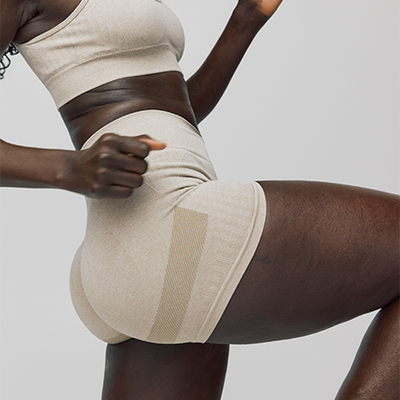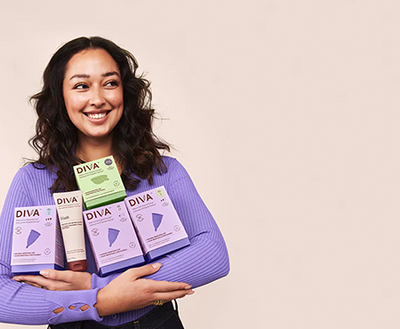

Ah, the elusive healthy vaginal microbiome and vaginal pH balance. Like many people who menstruate, you might have heard of these terms, but you may have no idea what they mean or how to keep your own vaginal health on track. Yes, there are many things that can cause it to go whacky — like hormones, stress and more — but if you’re someone who seems to struggle with vaginal issue after issue, there could be a cause you haven’t thought of before: PIV sex.
You’re not alone. Did you know that around 138 million women worldwide — 9 million in the United States and Canada alone — struggle with their vaginal health and pH? According to one report by Harvard Health, during a lifetime, 75 percent of all women are likely to have at least one yeast infection, and up to 45 percent have two or more. It’s highly likely that a lot of these are caused by having PIV sex without the proper precautions.
What is a healthy vaginal microbiome? How can PIV sex influence it? Is there a way to prevent your pH from changing from sex with your partner? To answer all your burning questions, we’ve recruited Dr. Himali Maniar Patel, a long-time gynecologist and healthcare consultant at ClinicSpots, to give us the full lowdown on vulvovaginal health, so you can get back to being healthy (and sexually happy!)
What is a healthy vaginal microbiome?
First up: What is a healthy vaginal microbiome, exactly? It’s when a vagina is mainly made up of beneficial (and necessary) bacteria called the Lactobacillus strain. While you might hear the word bacteria and automatically think negative thoughts, though, think again. This strain is actually responsible for keeping folks with vulvas happy, healthy and free from the unpleasant vaginal issues we’ve all had at one time or another.
According to Dr. Patel, it is these bacteria that produce lactic acid, which keeps the vaginal pH on the acidic side — typically between a pH level of 3.8 and 4.5 — and discourages the growth of harmful bacteria and yeast.
“This balance is essential for preventing infections like bacterial vaginosis and yeast infections and even provides some protection against certain STIs,” she explains, “Every person’s microbiome is unique, but a predominance of Lactobacillus is a reliable marker of a well-functioning vaginal environment that promotes both comfort and resilience.”
How Can the Vaginal Microbiome Be Disrupted?
Unfortunately, there are a lot of things that can throw off the vaginal microbiome (PIV sex and other types of intimacy, included!) But here are a few other expert-approved potential culprits to be mindful of, below.
Are you frequently taking antibiotics?
If you’ve been struggling with your vaginal microbiome, and you’ve also had recurrent urinary tract infections (AKA UTIs) or you’ve been sick a lot recently, the culprit for your pH balance may just be the antibiotics you’ve been taking.
“Antibiotics are a big one, as they can kill off beneficial bacteria along with harmful ones, leaving room for imbalances,” Dr. Patel says.
Consider your hormones
Another big one? Hormonal shifts or where you are in your cycle can also affect your vaginal microbiome health. Hormonal shifts, Dr. Patel adds, whether from menstruation, pregnancy, or menopause, can affect your pH levels and can change the microbiome’s balance.
Put down the douche
We know that the vagina is self-cleaning so there’s absolutely no reason to douche. Douching can even lead to an even higher risk of developing problems. But it’s not the only culprit, either.
“I’ve seen lifestyle choices, like douching, using scented products, or wearing tight, non-breathable fabrics,” she says, “Have a similar effect by introducing irritants or creating a less balanced environment.”
Try to relax
Like we said, so much can contribute to a healthy vaginal microbiome. Even stress, which we all experience from time to time, can play a huge role in your pH balance. Hormonal changes from stress may indirectly affect the microbiome, Dr. Patel adds.
How does PIV sex change the vaginal microbiome?
As you can see, there are many different causes of what could throw off your vaginal microbiome. But above all, sex is a big one. While intimacy of any kind can lead to pH issues, no matter where you are on the sexuality spectrum, but PIV sex, specifically, can impact your body's pH balance.
“Sex can temporarily impact the vaginal microbiome by introducing new bacteria from both partners and by altering the pH,” Dr. Patel explains, “Semen, for example, has a more alkaline pH, which can raise the vaginal pH and make it easier for unwanted bacteria or yeast to thrive.”
Plus, sexual activity itself can bring in bacteria from the skin or other areas of the body that don’t naturally belong in the vaginal environment. If you’re a UTI haver, you might know a bit about this. Typically, the body can re-balance on its own, but frequent shifts in pH or exposure to new bacteria may make some people more prone to infections.
6 Ways to Keep the Vaginal Microbiome Healthy and Balanced
So what can you do to fix it? Whether you’re experiencing an off pH from PIV sex or something else, Dr. Patel recommends these six simple, yet effective practices to maintain the most healthy vaginal microbiome you can, below.
1. Use condoms
If you’re having PIV sex, a condom is always a good idea (and not just for pregnancy prevention.) “A barrier protection like condoms prevents exposure to semen as well as assists in checking the balance of the vaginal PH,” she says.
2. Avoid scented soaps
Another thing to consider is staying away from scented soaps. When it comes to your most sensitive areas, heavily scented soaps can alter the normal bacterial flora.
3. Opt for breathability
“Opting for breathable cotton underwear and avoiding prolonged wear of damp clothes,” she suggests, “like swimsuits or workout gear, helps keep the area dry and comfortable.”
4. Rinse off after
While you may want to opt for cuddling in bed vs. hopping to the washroom, if you’re struggling with your vaginal microbiome, it’s always a good idea to get up and do what must be done. Make sure to always pee after PIV sex, and for some, taking a gentle rinse with plain water can help maintain their pH balance.
5. Take probiotics
A simple, but practical tidbit. Including probiotics in your diet, from sources like yogurt or kefir, can support beneficial bacteria. If you’re not into that, you can also opt for taking probiotic supplements.
6. Drink a lot of water
“Drinking water keeps tissue healthy and comfortable, while urination after sexual intercourse helps remove bacteria that intruded,” Dr. Patel encourages, “Staying well-hydrated and managing stress are beneficial as well, and can both help support the body’s natural balance.”
While it might seem complicated, maintaining a healthy vaginal microbiome doesn’t have to be. It’s often just about simple, consistent habits. Gentle hygiene, thoughtful product choices, and of course, being mindful of factors like your PIV sex aftercare can make a really meaningful difference in supporting your own balance, comfort, and resilience over time.













